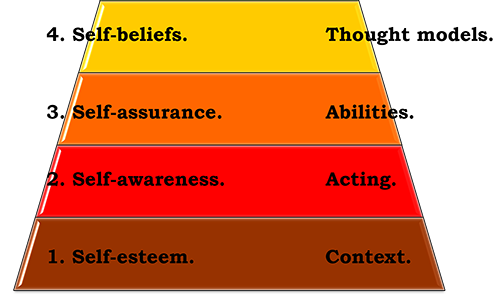 Inner beliefs control what you do more than your skills do Inner beliefs control what you do more than your skills do
Despite the fact that one in reality knows how to do something, an opposing inner belief will always control how one acts.
"Whether you believe
that you can
or that you cannot,
you will be right."
(Henry Ford)
Negative and limiting self-beliefs are more common than most people are aware of. Many of these inner subconscious beliefs have become established early in life, during childhood and upbringing. Authoritative parents that have not been able to see their child and its needs, stern teachers with poor listening abilities, bullies in school or on the street - all these can have contributed and can have established different negative beliefs about oneself.
These beliefs
can then have become reinforced during life by subconscious ways of acting towards people around that have reminded oneself of the original "bullies". One may even have ended up in a destructive relationship with a domineering partner because of one's negative conviction that one is not worth better...
 Positive self-esteem, good self-awareness and self-assurance help Positive self-esteem, good self-awareness and self-assurance help
To work on these levels is helpful, but not sufficient - negative limiting beliefs are often buried deep in the subconscious mind and work as conditioned reflexes, despite one's common sense and despite consciously knowing that they are incorrect.
So even if one naturally is helped by working on the levels below, and even if this can be necessary, one sometimes needs to explore and to change the deeply buried structures of thought and emotion that build inner beliefs.
 To discover and eliminate unrealistic negative beliefs makes you free To discover and eliminate unrealistic negative beliefs makes you free
You will benefit from working on your inner beliefs if
- Your beliefs about yourself are emotional and
are often illogical and lack connection to reality.
- You limit yourself because of your negative beliefs about yourself,
your inabilities or your shortcomings.
- You have had your negative thought patterns as long as you can remember, many are results of conditioning during your upbringing.
- Many of your negative beliefs come by reflex,
without conscious thought or reflection.
and much in PsykosyntesForums and Life Leadership Coachings services and products focuses on making you aware of negative inner beliefs in order to change them into positive strengthening beliefs about yourself (in alphabetical order):
- Coaching, on the level Mentor.
- Negative expectations can be the result of subconscious frames of thought that lead to negative beliefs about your future. Reprogram yourself so that you become a realistic optimist!
- Psychosynthesis Visualizations can change inner beliefs on a very deep level. For example, listen to The Goal, and strengthen your ability to ignore other peoples' negative beliefs about you.
- Stuttering is often reinforced by negative beliefs about oneself. The e-course includes exercises on all levels, but works a lot on the level of inner beliefs.
- The Belief Buster. A fun and liberating exercise to be used when you have worked for a while with your inner negative beliefs, and which will "dispose" the last remnants from your subconscious mind.
- The Immune System can react on inner beliefs, triggering on something unharmful. A visualization exercise for allergy, electric over-sensitivity, hay-fever, etc.
- The Well, a visualization exercise for helping you access your inner resources, even when you harbor negative thoughts or emotions.
 Transforming Negative Thinking Transforming Negative Thinking
In therapy or in coaching, many sometimes encounter the advice to learn Positive Thinking, as a tool for transforming a self-sabotaging and draining negative thinking into something that supports and empowers.
Even if the intention behind this advice is a positive one, there never the less is a risk for an uncritical focus on positive thinking not being helpful at all, but rather that it leads to ignoring problems that may have to be confronted, and / or that it leads to feelings of guilt for thinking in negative terms.
A better term is therefore "True Thinking". This choice of wording points at the fact that negative thinking sometimes can be based on erroneous interpretations of reality, or that one imagines "a hidden meaning", or projects, one's preconceptions / fears / suspicions / interpretations into what one sees and hears from others.
Learning how to just become aware of unrealistic negative thinking is therefore an important first step. What one may benefit from learning next, is how to use both one's brain and heart in order to be able to perceive reality with awareness, in a realistic way, without preconceived judgment. In order to using "True Thinking" for being able to act in a conscious way, sense-fully, maturely, instead of re-acting out of emotional conditioned reflexes.
Watch a short video about the structure of negative thinking, and about True Thinking (8 minutes): |









